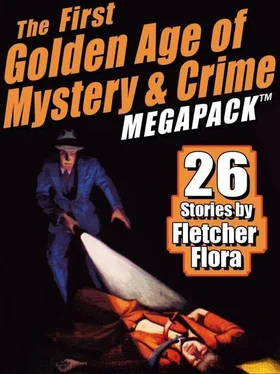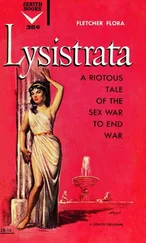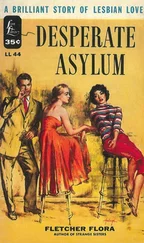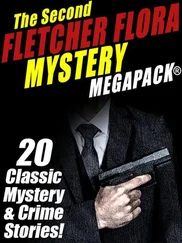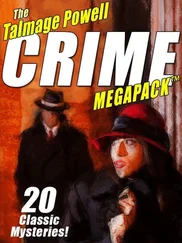Teresa turned and walked away to the far end of the living room. Turning again, she looked back at Mother and Father.
“Cousin Kelly is alive,” she said, “and he is coming soon to live with us here.”
She went on into the dining room, passing from view. Ahead of her, beyond the louvered swinging door to the kitchen, she heard Hannah at work. She pushed through the door and saw that Hannah had deserted her cleaning paraphernalia long enough to prepare cocktails. The silver shaker was on a tray on the cabinet, and beside the shaker were two fragile, long-stemmed glasses. Hannah looked hurried and harassed. It was after five, and she was obviously anxious to be away by six.
“Let me take the tray, Hannah,” Teresa said.
“I’m sure I’d be grateful to you for saving me the steps.” Hannah said. “Mind you don’t spill it, missy. Watch where you’re going.” Teresa took the tray and pushed back through the louvered door into the dining room. In the pocket of her yellow jumper, the love potion felt as heavy as gold dust.
It was all over, everything done that needed doing, and everyone gone who had been there except a worn and rather seedy little man and Teresa and Hannah. The man spoke with gentle weariness in a tone of futility.
“Now, Teresa,” he said, “tell me again exactly where you got the pois — the ‘love potion’.”
“Cousin Kelly gave it to me. We were in the park.”
“Why did Cousin Kelly give it to you?”
“It was supposed to make Mother and Father love him. Then he could come and live with us here.”
“Your mother and father didn’t love Cousin Kelly?”
“No.” She paused, a shadow passing across her eyes, as if she were struck for a moment by a presentiment of wonder. “Mother said that Cousin Kelly was dead.”
“I know.”
“She said he died years ago. He fell off a cliff. But he wasn’t. Dead, I mean. I was in the park with him this afternoon.”
“And you met your neighbor there? What is her name?”
“Mrs. Carter. She was rude to Cousin Kelly. He was standing right there, holding my hand, and she ignored him.”
“Are you sure she saw him?”
“How could she have helped? He was standing right there .”
“Mrs. Carter told me that you were alone when she saw you. There was no one with you at all.”
“I don’t understand it.” Again the shadow passed over her eyes. “He was holding my hand, and later he gave me the love potion.”
“All right.” The little policeman stirred uneasily. He was feeling, for some reason, a chill in his bones. “Last Sunday it rained. You couldn’t go to the park, and so Cousin Kelly visited you here. Isn’t that what you told me?”
“Yes. He came right up to my room. He was there all afternoon.”
“Poor little dear.” Hannah reached an arm toward Teresa as if to brush from the child the gathering shadows of evil. “She has been alone too much. She lives in fantasy.”
“You are certain that no one came last Sunday?”
“There was no one here but the family and me. No one. The hall door is kept locked on the inside. No one could have entered without being admitted.”
“Do you think that Mrs. Carter would deliberately lie about not seeing Cousin Kelly in the park?”
“No.”
“Do you think your mother would have lied about his being dead?”
“No.”
“Do you think Hannah would have lied about his not being here last Sunday?”
“No.”
“There you are, then.” Leaning forward, he spoke slowly with a kind of dreadful reasonableness, and every tired syllable was an echo of his dread and a measure of his futility. “Listen to me, Teresa. You must tell me exactly where you got the love potion. It’s very important.”
And she met his dreadful reasonableness, as he had known she would, with dreadful innocence.
“Cousin Kelly gave it to me. In the park. He was there .”
Originally published in Alfred Hitchcock’s Mystery Magazine, October 1968.
She had walked all the way to her father’s house, three miles across the town, and now she had been sitting alone in her old room for more than an hour. She knew that it was more than an hour because the clock in the front hall had said almost a quarter to four when she arrived, and the five o’clock whistle had just sounded up north at the roundhouse in the railroad yards. At the first shrill blast of the whistle, she had raised her eyes and cocked her head in an attitude of listening, as if she were hearing something new and strange that only she in all the world could hear, but when the sound had diminished and died away she had lowered her eyes again and sat staring, as before, at her hands folded in her lap. In all the time she had been here, except for the brief interval when the whistle blew, she had hardly moved. She wondered if she should get up and go into the kitchen and begin preparing supper for her father, who would soon be getting home from his job in the yards. No matter. She had burned all her energy in the simple and exhausting ordeal of getting here. She had come, indeed, only because there was no place else to go. Now that she was here, there was nothing else to do.
She was an intruder in the little room that she had known so intimately for so many years. She was not welcome here. The room wanted her to leave. She could feel the pervasive hostility in the still, stale air, the corrosive bitterness of the abandoned, the sad, sour lassitude of the lost. But this was just her imagination, of course. It was part of the encroaching terror she had brought with her across town. The room was no different. The room was the same. There was the desk at which she had written daily in her diary, the fanciful log of hopeful days, and there above the desk was the framed copy of Gauguin’s Yellow Christ, which she had admired and hung to appease some distorted hunger in her heart. There on the walls was the same pale blue paper, perhaps a little more faded and soiled, stained at one corner of the ceiling where the probing rain had seeped through from the attic below the low roof. And there against the wall between the room’s two windows was the long mirror that had reflected her imperceptible growth from day to day and year to year, and had told her all the while that she was a pretty girl and would be a lovely woman. She wanted suddenly to run away from the walls and the mirror and the Yellow Christ, but she sat and stared at her folded hands. She wanted to scream, but she was mute. She sat fixed and mute in the terror she had brought with her. Having fled from the fear of death, she wished irrationally that she could die.
She heard her father’s steps on the porch outside. She heard them in the hall, moving toward the rear of the house. For a while, after they were gone, she continued to sit quite still on the edge of her bed, her hands folded in her lap, and then she got up abruptly, as though prodded by sudden compulsion, and went out of the room and followed the footsteps into the kitchen. Her father, his back turned to her, was standing before the open door of the refrigerator. Hearing her behind him, he turned, holding a can of beer in one hand, pushing the refrigerator door closed with the other. He was a tall, lean man with stooped shoulders and long, lank hair grown shaggy over his ears and on the back of his neck. About him, like a miasma sensed but not seen, there was an air of stale accommodation to dismal years, the atmosphere of repeated frustrations. He peered at his daughter through the dim light of the kitchen.
“Ellen?” he said. “Is that you, Ellen?”
“You can see very well that it’s me,” she said.
He carried the can of beer to the kitchen table and sat down facing her. There was a metal opener on the table. He plugged the can and took a long drink of the beer.
Читать дальше
